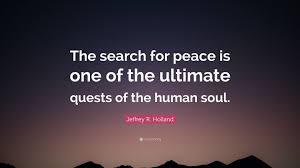We seek peace.
What peace are we seeking and when will we find it? Because of God’s grace and mercy, we experience various degrees of peace even in this fallen world. We are no longer in enmity with God because of Jesus’ gift of life (2 Cor. 5:18). We on occasion see glimpses of peace between nations and groups divided because of preference, politics, or social agendas. However, even that peace is tenuous and subject to change with the next difference of opinion.
The search for peace is a pursuit that will continue until we transition to eternity. So why are we trying so hard to achieve it now? Because it is God’s desire that we live in peace with each other and experience peace within. Without peace we will be hindered from accomplishing our divine purpose which includes glorifying God.
Peace was God’s First Choice
When God and man lived in the Garden of Eden, their world was designed to accomplish a specific purpose. God would provide for His creation—food, clothing, shelter. Man in turn would be obedient to his Creator and reverence God. They would enjoy an intimate and harmonious relationship. There was peace. Of course, we know what happened to the plan of creation.
Although many attempts have been made through the institution of covenants and laws, man has always been troubled with contention, strife, and war (Hab. 1:3; James 4:1; Rom. 2:8). The biblical text relates attempts by God’s prophets and priests to bring peace, but none could be found—externally nor within.
Only Jesus Christ, the Promised Messiah, could bring the “peace” that would reverse the ravages of sin that resulted in broken relationships and shattered hearts (Isa. 9:6-7; Mic. 5:4-5).
Peace is a hard issue.
Early in our study we defined peace as a stress-free state of security and calmness, everything co-existing in perfect harmony and freedom. Let’s be real. Man cannot orchestrate this kind of peace while we live in this fallen world. And this is the world we must live in right now. The peace described in this definition will be possible when Jesus Christ returns and rules physically during the Millennial Age.
However, right now God’s peace is guaranteed by His unchanging promises and can be found through faith in Jesus Christ. It is possible spiritually through the Holy Spirit living within us. The Holy Spirit fortifies us as we live in this fallen world. He sustains us even in the most desperate of circumstances (Gal. 5:22).
Peace that passes all understanding.
The Apostle Paul, while imprisoned in Rome, appealed to the church in Phillipi, to “rejoice in the Lord”. Strange message considering Paul’s situation. But while experiencing the backlash of living in a fallen world, he found peace in his situation. He offered the same to them (Phil. 4:6-7, NLT).
Don’t worry about anything; instead, pray about everything. Tell God what you need, and thank him for all he has done. Then you will experience God’s peace, which exceeds anything we can understand. His peace will guard your hearts and minds as you live in Christ Jesus.
Chrysostom, Eastern church father and archbishop of Constantinople wrote these words on “how this peace—God’s peace—passes all understanding”.
The peace of God, which He imparts to us, passes all understanding. For who could have expected and who could have hoped for such benefits? It transcends every human intellect and all speech. For His enemies, for those who hate Him, for the apostates—for all these He did not refuse to give his only begotten Son, so as to make peace with them. The peace which will preserve us is the one of which Christ says, “My peace I leave with you; My peace I give you.” For this peace passes all human understanding. How? When He sees that we should be at peace with enemies, with the unrighteous, with those who display contentiousness and hostility toward us, how does this not pass human understanding?[1]
God’s peace is what we need for 21st century living. Peace that will not only exceed our expectations but also guard our hearts and minds, from fear, anxiety, hopelessness, and despair. Our “call to action” as believers is to, like Jesus’ Disciples and the Apostle Paul, become agents of peace and ministers of reconciliation to a “peaceless” world. In the world’s search for peace, let us be the light to show them where they can find it (Matt. 5:9).
[1] Ancient Christian Commentary of Scripture, New Testament VIII, Mark J. Edwards








